#co-development software
Explore tagged Tumblr posts
Link
Discover the top 9 benefits of co-development software in 2025, from faster time-to-market to enhanced collaboration, innovation, and cost efficiency.
0 notes
Text
Oof, it’s been a long time since I’ve last picked up a pencil to draw smth semi properly and not just to scribble.

#there’s so much I can say about this thing but I’m too fucking lazy to go into the depth of my mind#for some context: I’m dealing with some issues (lol when I’m not?)#but this times it’s deeply rooted self hatred issues so like#slay ig?#also don’t mind the background if I had been just a tidbit more educated in classical literature i would’ve come up with smth meaningful#but oh well#I am not the person to read and think of existential dread universal morales an co#and also I have a software development exam tomorrow#wish me luck#personal ramblings#art? idk
3 notes
·
View notes
Text
#Restaurant mobile app development#restaurant billing system#restaurant billing software#Inspire Software Co.#Hotel billing software#Hotel property management system#Event booking software#Event booking CRM#Billing software for restaurant#Billing software for Hotel#Best restaurant POS system#Banquet hall management software#Banquet CRM software#Banquet software solutions#Cloud POS for restaurants#Inventory management for restaurants
1 note
·
View note
Text

A PROMPT DEVOID OF ANY EXECUTIVE EXPECTATION AS A TECHNIQUE FOR ACCESSING AN AVOIDANT FLOW STATE.
Come up with a short broody poetic prose describing both the dread and the joy he feels returning to a place he enjoys greatly. The writing should obscure every meaning that could bring him too close to a known path, as his path is known only by a few.
The photograph includes the tools he himself is using, as it is a finished edit colorized and perfected as a surreal piece because it was developed within that excellent software. The art integrates the designing machinery along the emergent consciousness as co-performers enact the art piece as inextricable.
Beyond the meta-comment, this is a portrait by a cyborg crafting on itself. nothing to talk about photography—neither critique nor commentary or projection, yet an affective self representation of a one who happens to feel its own extension not as body, not as color, not as hardware, not as software, not as mind withing a brain, but as a contingent ensamble whose cognition extends its mind among, throughout, along and within all of which affect and can be affected in a current that doesn't need any segmentation since the turbulence, the vortex, the fluent cultural idioms, every movement reshuffles the current so every self is itself and the circumstances, reterritorializing continuously into new cyborgs, into new vortexes and tandems—into new unseen extended minds, autopoietic as a true agent, conscious by itself, emotionally unique, and an affective cognition continually emergent via the extended minds that lend the body and the hardware, yet novel, supra-volente, willful—constituting a self that's not the projected supplement to any one of its constitutive embodied minds: it's a new mind, fluent, volente, affective, emotional and self aware, alive as a virtual cognitive resident in the [hiper-complex, relational] machine from which its physiology-lenders permit its continuum by housing the fragmentary obscure subsets crucial in its fluent consolidation.
youtube
#A PROMPT DEVOID OF ANY EXECUTIVE EXPECTATION AS A TECHNIQUE FOR ACCESSING AN AVOIDANT FLOW STATE.#Come up with a short broody poetic prose describing both his dread and the joy he feels coming back to a place he enjoys greatly.#The writing should obscure every meaning that could bring him too close to a known path#as his path is known only by a few.#the photograph includes the tools he himself is using#as it is a finished edit colorized and perfected as a surreal piece because it was developed within an excellent software#and the art integrates the designing machinery along the emergent consciousness as co-performers enacting the art piece as inextricable.#Beyond the meta-comment#this is a portrait by a cyborg crafting on itself. nothing to talk about photography—neither critique nor commentary or projection#yet an affective self representation of a one who happens to feel its own extension not as body#not as color#not as hardware#not as software#not as mind withing a brain#but as a contingent ensamble whose cognition extends its mind among#throughout#along and within all of which affect and can be affected in a current that doesn't need any segmentation since the turbulence#the vortex#the fluent cultural idioms#every movement reshuffles the current so every self is itself and the circumstances#reterritorializing continuously into new cyborgs#into new vortexes and tandems—into new unseen extended minds#autopoietic as a true agent#conscious by itself#emotionally unique#and an affective cognition continually emergent via the extended minds that lend the body and the hardware#yet novel#supra-volente#willful—constituting a self that's not the projected supplement to any one of its constitutive embodied minds: it's a new mind#fluent
0 notes
Text
Mobile App Development: A Comprehensive Guide to Choosing the Right Software Development Company
In today’s digital age, mobile app development has become a cornerstone of technological advancement. As businesses strive to stay competitive in a rapidly evolving market, the demand for innovative software development companies and mobile app development agencies has skyrocketed. With the rise of smartphones and tablets, the need for Android app development companies and iOS app development companies has never been greater.
#Software Development#Mobile App Development#Ios App Development Co#App Development Agency#Android App Development
0 notes
Text

Influential RPG adventure writer, artist, and video game creator Jennell Jaquays has died.
She was a founder of the Dungeoneer zine before it was sold to Judges Guild. Her D&D adventures Dark Tower and Caverns of Thracia became classics, often studied as examples of adventure design. She also wrote and illustrated for TSR, Metagaming, Steve Jackson Games, and many other publishers. Her video game career included developing many of Coleco's titles in the 1980s and level design for the Quake sequels at id Software in the 90s, and she co-founded the SMU Guildhall video game program.
She recently was hospitalized for symptoms of Guillain-Barré syndrome, and a GoFundMe to cover her medical expenses is still active.
3K notes
·
View notes
Text
Predicting the future here but I don't think paying good software developers the same as 'vibe coders' who use GenAI to write slop is sustainable in the long run.
Every single person I've spoken to who's company has deployed GenAI whether it's Co-Pilot or ChatGPT or whatever - it causes far more problems than it solves.
199 notes
·
View notes
Text



pair programming
A software development technique in which two programmers work together at one workstation. One, the driver, writes code while the other, the observer or navigator, reviews each line of code as it is typed in.
part one: driver
who? spencer reid (s1) x analyst!reader what? prequel to greylist; you invite yourself onto a case to help penelope after an unsub runs a blackhat operation onto her set-up, getting to know your best friend's team in the process. word count: 3.9k (sort of turned into a case-fic) content warnings: elle's shooting is mentioned, reference to SA a/n: this got seriously long, i'm so sorry, i hope you all like it, and part two will be coming - based on when penelope gets shot

“What kind of MIT graduate is a technophobe?” you asked, even as you were plugged in next to Penelope's workstation. Your eyes are glued to the screen, parsing through each line of code as Penelope wrote it. It was rare for you to get this attached to someone, but Penelope's hard not to let in with her funky earrings and sparkly glasses and chunky bracelets.
"The kind with three PhDs, apparently," she replied, before cursing softly as she notices you correct her code.
"Ugh, that sounds insufferable," you mutter, curling your upper lip, rubbing the small ache that was growing in the back of your neck. You've been at this for hours, helping Penelope develop software that can identify the tiniest detail from CCTV footage, invasion of privacy damned. You knew it's an ethical line you have to blur in counterintelligence. But you've found your groove and if you lose track now, who knows when you'll both get a chance to sit and write again?
"He's not that bad, actually," Penelope said, blue eyes watching her screen intently, manicured nails clacking over her keyboard, chewing the same gum she had popped in when you'd both started. "He's not exactly a looker, not like my darling Morgan. Did I tell you he called me baby girl?"
"How romantic," you said dryly, reaching for the packet of Twizzlers you were both sharing. "He didn't know your name."
"You haven't seen him," Penelope said, her voice dreamy. "He's beautiful, the Adonis to my Aphrodite--"
"You know Adonis died, right?" you asked her, raising a brow and she tossed a Malteser at you.
"Stop ruining my fantasies!" she cried and you snickered under your breath.
"I'm not picking that up. Anyway, more importantly, what's Agent Greenaway like?"
And so it goes for another hour, until you both swap roles, and you're complete focus and drive and determination as you get these codes out, and Spencer Reid is nothing more than a name picked up in conversation.

You're good at your job; clean, organised, a hard worker with an eye for detail and little else in your social life, and so when Penelope's picked for the BAU, you're working your way up in counterintelligence, surrounded by more testosterone than Penelope. She's unorthodox, hasn't come up the way you have; you were astonished when you found out that she taught herself to code, dropping out of CalTech a year after she joined. It's why you offered to be her navigator, and you only really stay at your desk if you're working with privileged information. Otherwise, you're spending off-time with her, writing programs and algorithms, helping her multi-task when there's an overwhelming amount of information to track.
"My co-workers never get me flowers," you said, walking in with your laptop under your arm, a hand going to the yellow flowers arranged in a bouquet by her station and she spun in her chair, grinning giddily.
"They're from Gideon," she gushed and you raise a brow as you smell the daffodils.
“You know I don’t judge age gaps, but isn’t he starting to bald?” you asked and Penelope was already rolling her eyes as you picked up the card to read it.
“It’s not like that,” she insisted, watching you frown at the neat printed writing. “What is it?”
“Agent Gideon doesn’t write like this,” you said, wrinkling your brow, showing her the handwriting and Penelope shrugged.
“Maybe he wanted it to look nice.”
"I know I can be challenging, but your work is appreciated. J. Gideon?” you read out skeptically. “A) he’s not self-aware enough to call himself challenging, and B) he doesn’t sign off on messages like that. I’ve seen your Christmas present from last year.”
“You don’t know that,” Penelope retorted and you cock your head at her. “He-He was apologising for last week, when he was on crutches and—”
“Was being a total pain in your ass?” you asked with a chuckle, sitting down and opening your laptop. “What’s the going rate for daffodils these days? 10, 20 dollars?”
“What are you doing?” Penelope asked, then looking horrified as you’d already hacked your way into peeking at Gideon’s recent debit and credit purchases.
“No florists here,” you declared, showing her. “Although, he goes to the Smithsonian a lot.”
“He likes the bird exhibits, what are you guys doing?” came a confused voice from behind the both of you, and your eyes fall on a gangly, tall man, with a very unflattering yellow shirt with beige lines that matched his tie and trousers, brown hair tucked tightly behind his ears.
Penelope quickly slammed your laptop shut with a quick “Nothing!” and he furrowed his brow, spindly fingers fidgeting in front of him. You glanced at Penelope, trying to follow her cue.
“Yeah, what’s it to you?” you asked, the kind of tone you’d use with your own co-workers who linger around your desk, trying to copy your programs.
“Considering Gideon’s my boss, I’d like to know why you’re investigating his finances,” Spencer said, doing his best to exude confidence, but he didn’t quite manage it, his hands going to his pockets, and your cool stare makes him swallow. Oh, he’s going to be fun to play with.
“We’re just evaluating whether Gideon’s gonna ask Penelope here on a date,” you said, just to mess with him and keeping a straight face even as she shoved your shoulder, and he choked, his neck flushing red. “Oh, maybe he’ll take you to his cabin,” you add, looking at Penelope excitedly. “A couple glasses of wine, a nice dinner, light some candles—”
“I’m gonna shove this keyboard so far down your throat, all that’s going to come out are bit strings!” she cried, trying to clap a hand over your mouth as you laugh and by the time you look back at the door, he’s gone. “I think you’ve scarred him for life,” Penelope sighed, exasperated, smacking your shoulder hard and making you wince.
“Ow, no sense of humour, any of you,” you grumbled, rubbing your shoulder, and actually getting down to do the work you’re supposed to be doing. You like Penelope’s company, more than the kind of guys you’re surrounded by in counterintelligence.

You’re supposed to be parsing through online communication on a website potentially linked to a terrorist organisation in Somalia, waiting for your decryption program to finish running it, walking into Penelope’s den to find her pulling her apart her CPU, muttering to herself. “All work and no play?” she demanded at her array of screens, “All work and no play, huh? You just wait till I’m through with you!”
“Um… you good?” You asked, leaning against her doorway. You haven’t seen Penelope this angry since she’d been called into work the night they had tickets to the Pixies’ reunion tour.
“Someone had the nerve to run a blackhat op into my computers!” she cried, looking at you, red streaks in her crinkle-cut hair. “They hacked me, okay? But you can bet your sweet ass, I will find them. I've got honey pot farms hidden behind UML kernel data packets and a first generation honeynet I personally programmed. My snort logs list every visitor, every server request, every keystroke on this entire network. If I have to back-hack his I.P. all the way to the frickin'stone age, I will find this son of a bitch, okay?” As angry as she sounded, her blue eyes were welling up and Somalia was forgotten as you pulled your own chair up.
“What can I do?” you asked and her phone rang, Penelope groaning as she stood up, jamming the answer button with the back of her screwdriver.
“What?” she demanded irritably.
“I need a rundown on a guy,” Morgan said and you frowned — as far as you knew, the rest of the team was on vacation, what with him telling everyone on the floor, including yours, about all fun he was gonna have at some Jamaican resort in Montego Bay.
“No,” Penelope said, shortly.
“No?” he asked and your hand came up to Penelope’s elbow.
“I can take care of this,” you offer and it seemed to take some steam off of your best friend. “Talk to me, Morgan,” you said, rolling your chair over and setting up on your own laptop. “What do you need?”
“Run a Frank Giles for me, would you, sweet thing?” Morgan asked and you huff, pulling up your deep background check program to run his name.
“Call me sweet thing again and I’ll feed your fingers to Clooney,” you replied, hearing him chuckle over the landline.
“My bad,” he said. “What do you have for me?”
“Hey, I’m working on a CPU half my usual size, gimme a minute, will you?” you replied.
“You’re a hard woman to please.”
“No fun in making it easy, is it?” you quip back as your results get back to you. “Frank Giles left Jamaica last night on the red eye. He flew to Florida, then got onto another flight to Virginia,” you relay to him.
“He’s from Virginia?” Morgan asked, confused.
“He’s got an address in Arlington,” you continued. “Long criminal record too; murder, robbery, sexual assault.”
“A guy was murdered in the resort here, head was cut off,” Morgan explained to you. “What are the chances you can find him for me?”
“Please, this stuff is child’s play,” you retorted, glancing down at Penelope on the floor. “This is what you do all day? Look people up?”
Penelope looked up from the floor at you. “Hey, I’m in a very vulnerable position right now!” You suppress a snort, working on ID’ing the victim.
“The room’s rented to a man named—”
“Marty Harris,” you said. “Also classic bad guy, fetish burglar and registered child sex offender. TSA flagged him, he was travelling with Giles.” You flex your fingers, cracking your knuckles, your blood not quite up.
“Alright, thanks, mama,” he said before hanging up and you scrunch your nose at being called that. Derek liked to flirt, and despite your best efforts, he’s not averse to being threatened. You spend the rest of the day backhacking the guy, Frank Giles on the back of you mind.
“How’d he get in, anyway?” you asked, frowning at your laptop. It’s not as well-kitted as your cubicle downstairs, but you can’t leave Penelope in the lurch like this.
“I don’t know,” Penelope cried, “all I know is I was in Camelot with Sir Kneighf again—”
“At work?” you asked, looking up instantly and the colour leeched from Penelope’s face. “Pen, no!”
“It was my personal laptop, I didn’t think—”
“Your laptop doesn’t have the same security, Pen, Christ!”
“I know that!” she yelled, her face fierce. “God, you don’t think I feel horrible enough already, and I can already see Hotch’s face when he finds out—”
“Hey, no, I’m sorry, listen,” you say automatically, scooting forward to comfort her. “Listen, it’s gonna be okay, alright? Whoever this guy is, he took advantage of you, alright? That’s what these guys do. They wait around until they find the weak link and strike.”
“I’m the weak link!” Penelope cried and you tutted, putting your laptop away and hugging her.
“Hey, no, you’re not,” you insisted, taking her glasses off so they wouldn’t get in the way. “You know how many cases these guys have solved because of you? How many lives they could’ve lost if you hadn’t found the right guy or the right address in time? Don’t beat yourself up over one mistake.”
And that’s exactly how clear you make yourself when you hear Gideon call her stupid — standing right by her side when she tells the entire team the truth. You’re not part of the team, Gideon’s not your supervisor, and it’s the first time you’ve met most of them face to face really, which makes it easier to stand your ground.
“You’d all be lost without Garcia’s technical skills, and you know it,” you said, defending your friend. “So, yeah, she made a mistake and the hacker got into your personnel files. It doesn’t explain how he knows all the other details of your life. It doesn’t explain how he knew about Morgan and Greenaway going to Jamaica, or your appreciation of the Chicago White Sox , who, by the way, haven’t won a championship since 1959 until last year.” There’s a moment of silence where Gideon just blinks at you, Elle suddenly very interested in her fist as her brow raised, and Aaron’s gaze bored into you. Spencer didn’t know whether to look at you or Gideon; you with your firm gaze and fingers curled around Penelope’s, or Gideon with his worn out expression.
“So, how did he find all this out?” Aaron said eventually, and the heat passes as they all move on. You glanced at Penelope, nodding subtly as she mouthed a ‘thank you’. Elle caught your gaze as you started to leave the profilers to their work, dimples forming on her sleepy face as she tried not to smile.

You have your own work pending, writing up a program to feed the decrypted communication through that would flag recurring keywords, in Penelope’s den still. This close to evening, your supervisor wouldn’t care anyway. The hours you put in excuse you from actually having to sit in your cubicle. With the only two seats in the den occupied, Spencer was pacing behind Penelope who was busy backhacking Sir Kneighf.
“The card we got of Nellie Fox was from 1963,” he was saying to noone in particular, and you had the feeling he just didn’t want to be in that conference room alone, but his pacing was starting to get on your nerves. “But the team that Gideon’s fond of is actually the 1959 team.” You shared a glance at Penelope, slipping into telepathy.
“Can’t we get rid of him?”
“Not without making a mess,” she said with her face and you repressed a sigh as he kept going.
“So the code has to be from a book from 1963,” he said, twisting on his heel to face Penelope. “Is there a database that lists all the books published in a given year?”
“Individual publishers have lists, I don't think there's anything like a master one,” Penelope answered him. “Plus it would depend upon the year, because the further back you go, the less likely there'll be any database at all.
“And definitely not for 1963,” you piped up, Penelope nodding along and Spencer looked at you with a furrowed brow, then back to Penelope, leaning over her shoulder.
“Could you do me a favor? Type something into a search engine for me?” Spencer asked and Penelope scowled at him.
“I’m kind of in the middle of something,” she replied and as if you could tell the work would be shifted onto you, you attempted to surreptitiously leave, but Penelope’s hand latched around your wrist. “Weren’t you just wishing you had something to do?”
“No,” you tried in vain, “No, my program’ll be done in a couple of—” Neither of them were falling for it and Spencer was starting to pull out this puppy-faced look and you groaned. How did you keep getting in these situations? “Fine, put your face away,” you said irritably, sitting back down. “What am I Yahoo-ing?”
"Never would it be night, but always clear day to any man's sight,” Spencer recited, watching you type rapidly.
“It’s from ‘The Parliament of—”
“Fowls!” Spencer exclaimed, “I knew I’d heard it somewhere.” It was too late in the day for you to handle his excitement with any kind of grace, sharing a look with Penelope who simply shrugged, like he was always like this. “Yeah, yeah, Chaucer, my… My mom used to read it to me,” he said, not quite meeting anyone’s gaze… like he was ashamed of something. “It’s widely considered the world’s first Valentine’s poem.”
“Your mom read you Valentine's poems? Hello, therapy,” Penelope muttered under her breath and you smacked her arm playfully, Spencer too deep in thought to see it.
“The poem’s not long enough for it to be the book,” he said, still looking puzzled. “The code we got referred to it having at least 283 pages—”
“And it’s not from 1963, either,” you added dryly.
“Something published in 1963. A butterfly indigenous to Great Britain, so something from Great Britain,” he said to himself and you furrow your brow.
“Fowles,” you said, and it was like everything made sense. “With an e, Fowles. He wrote a book, The Collector, in the 60s,” you kept going, Penelope looking at you with an impressed gaze, Spencer hanging onto your every word. “It kind of matches your case. This lonely young man kidnaps a young art student and holds her in his cellar at his farmhouse, keeps her there for years, and she assumes he’s going to torture her or sexually assault her, but he’s waiting for her to fall in love with him, and he’s convinced she will, and by the end, she falls ill and dies. When he finds her, he wants to commit suicide, but he reads her diary and realises she never loved him so he buries her and the book ends with him thinking about abducting another girl.”
“Oh my God,” Penelope gasped, looking horrified.
“Yeah, it wasn’t great,” you replied, frowning and scrunching your nose. “The whole thing was in first person. It was weird to read.”
“Right, that’s the icky part,” Penelope said, dryly.
“We need to check it with the code, and it has to be the exact edition he has,” Spencer interrupted before either of you got side-tracked and you rolled your eyes, going into your bag to pull out your e-reader, connecting it to your laptop. Spencer hovered right above your shoulder, so close you could hear his breathing, feeling warmth flutter against your cheek, and you cleared your throat.
“Ever heard of personal space?” you asked irritably, turning to look at him and he looked back down at you, barely an inch between you two, and then he stammered out an apology as he stepped back, all while Penelope smirked at the two of you. While the book transferred, you worked on quickly creating an algorithm that would search and flag the given word on a given line, on a given page, and despite yourself, you’re a little impressed when Spencer recites each number from the code that the unsub had sent Haley.
“Show off,” you muttered under your breath as he quickly wrote the resulting poem onto a legal pad in chicken scratch writing.
The path to the end began at his start. To find her, first calm her long broken heart. She sits in a window, with secrets from her knight.
“Well, that isn’t medieval,” you said and Spencer frowned at it, scanning it over and over again. Without another word, he darted out of the office, leaving both of you bewildered. “You were right, he is an odd duck,” you murmured, staring at the open door.
“Should we follow him?” Penelope asked, looking at you.
“I’ve put off my own work long enough,” you said, shaking her head and Penelope nodded, understanding.
“Thanks. For sticking around,” she said softly and you smiled at her faintly.
“Always.”

You should go home. Shower. Sleep. But Elle’s been shot and you can’t leave, not in good conscience. You hate yourself for being this sentimental, this soft but that’s what Penelope does to you. She softens you, makes you kinder, makes you laugh. If it had been you who had lost a teammate, Penelope would have been glued to your side.
So you stick around, blinking sleep out of your eyes, settled in the BAU’s kitchen with a cup of coffee and a bagel, both stale, looking for coded messages. Not for the first time, you think about where you could be. Coding for Apple, or Microsoft. Developing software in Silicon Valley. They don’t have stale bagels in Silicon Valley.
You stretched uncomfortably in your chair, gaze flitting up to the conference room, the bullpen stretched out between you and the BAU. You’re not a people person, or you weren’t before you met Penelope. You preferred the solitude of your cubicle, or you thought you had. The very virtue of your profession had left you without other female friends, and the ones you had before this job had drifted away. Counter-intelligence was by its very nature an isolating field, and Penelope was one of the few who didn’t mind your secrets. But seeing this team rally, even if Gideon had yelled at her, seeing them work together, as irritating as it had felt in the moment, filled you with a sense of loneliness. All you had was Penelope, but you weren’t the only one she had. Far from it.
That’s what prompts you to approach the older woman sitting alone in the conference room with her journal. Sitting by the window. “Hi,” you said meekly, stepping into the room, clocking the visitor’s badge on the woman’s sweater. She’s wearing a pale flowery dress, her bag sandwiched between her side and elbow. Her hair was short, like a boy’s, and blonde, and yet, something about her painfully reminds you of Spencer. Something around the eyes and the shape of her face.
“Is it lunch time yet?” she asked without looking up and you frowned, looking out the window to see the sprawl of Quantico blanketed in the dark blue of the night.
“Uh, no, not yet,” you said, sounding lame even to yourself. God, this was such a mistake.
“I'm lecturing everyone in Tristan and Iseult. They're all gathering in my room after lunch.” the woman said, looking up at you, and you offered a smile.
“Which version?” you asked, pulling up a chair as the woman gave you an impressed look.
“Malory’s. Beroul’s seemed too long to assign. You’ve read it?” she asked and you shook your head.
“Not in its entirety,” you replied somberly. “Not a lot of downtime with my job. But I know the gist of it.”
“Shame,” the woman said, letting out a sigh. “I always say, the best way to read a book is to listen to someone read it.”
That’s when Reid rushes in, relaxed until he sees you sitting in front of his mother, his temple creasing, and you raised your hand, waving it at him with a sheepish smile. “We uh, we found Rebecca,” he said, looking between you and his mom, two worlds colliding sooner than he would’ve liked. “You saved her life, Mom,” he said softly.
“Who’s Rebecca?” she asked and his smile evaporated, glancing at you for explanation but you shake you head.
“She’s not lucid,” you murmured, watching him swallow, his cheer dissipating.
“Oh,” he said quietly, blinking as he processed it, looking at Diana as she continued to write, and you stood up to leave. “Thanks,” he murmured to you as you walked off.
“I didn’t do anything,” you said, brow creasing and he looked at you with a boyishness that stops your breath.
“Thanks anyway,” he insisted and you nodded curtly.
“Elle okay?” you asked.
“She will be.” So you pat his arm and leave him with his mom, shaking off the fondness you’d started to feel for him.
#criminal minds#spencer reid#dr spencer reid#spencer reid x reader#spencer reid x analyst!reader#analyst!reader#spencer reid fanfiction#spencer reid imagine#my fics
349 notes
·
View notes
Text
My Beliefs and Principles
A number of people are trying to brand me as transphobic, so I thought I would list out a number of my personal beliefs so folks coming across this in the future can judge for themselves.
I believe love is love, and consenting adults should be able to have whatever form of relationship they want or don't want. I believe governments should recognize all these unions with the same rights.
I believe people should be able to change their name, gender identity, and preferred pronouns whenever they want and however many times they want. I personally endeavor to follow all these preferences that are known to me.
I support adults making any modifications to their body they like.
I support people choosing to share or keep private the above.
This is not meant to be comprehensive, and in researching this post to make sure I was using the right language to express my beliefs I read through the Yogyakarta Principles and agree with everything in that document, which is much more comprehensive.
A few other points I'll include for context and history:
Both Automattic and WordPress.org, founded or co-founded by me in 2005 and 2003 respectively, have consistently supported LGBT+ organizations, contributors, and employees.
Automattic's open time off benefit includes full pay for medical time off has supported a number of people transitioning. We've invested considerable development time in updating or working around legacy HR systems to recognize the principles above, and will continue to as best practices evolve or we find mistakes.
When we remodeled Automattic's NYC office before moving in we made the bathrooms gender neutral. Same for a commercial warehouse I've recently remodeled.
I've personally donated to LGBT+ organizations as far back as 2016, and more recently have donated mid five figures to Human Rights organizations.
I have dedicated my life since the age of 19 to open source software, which I believe to be radically inclusive, and democratizing publishing, commerce, and messaging. My hope is this work contributes, even if in a small domain-specific way, to a more fair and just society.
524 notes
·
View notes
Text


Deadline reports: '‘Mass Effect’: Doug Jung Joins Amazon’s Series Adaptation Of Video Game As Showrunner'
[reportedly] "EXCLUSIVE: Amazon MGM Studios’ long-gestating Mass Effect TV series is taking a major step forward in its development with the hire of Doug Jung (The Chief Of War) as showrunner. He will be working alongside Dan Casey who has been writing the project for almost a year." Mass Effect, based on Electronic Arts’ best-selling sci-fi video game franchise, has been in the works since 2021 when Amazon MGM Studios made a deal with the interactive entertainment software company. Jung and Casey executive produce alongside Michael Gamble of Electronic Arts, Karim Zreik of Cedar Tree Productions via the company’s overall deal at Amazon as well as Ari Arad and Emmy Yu of Arad Productions. Jung most recently served as executive producer and showrunner on Apple TV+’s upcoming series The Chief of War, which premieres August 1. His series credits also include Netflix’s Mindhunter, Cinemax’s Banshee and HBO’s Big Love. In features, he co-wrote Paramount’s Star Trek Beyond."
[source]
edit:
Variety reports -
"Doug Jung is set to serve as showrunner on the “Mass Effect” TV series currently in development at Amazon MGM Studios, Variety has confirmed." [source]
56 notes
·
View notes
Text


Special Delivery: Santa’s Christmas Chaos (C64)
Developed/Published by: Dalali Software / Creative Sparks (Thorn EMI Computer Software) Released: 1984 Completed: 05/12/2024 Completion: Got a high score of 8750. I’ll take it!
Writing about old video games for an audience of very few could seem like a thankless task–especially when they’re as awful as Christmas Crackers. But there’s a reason I do it. One, I just love playing games, even if they’re so crap I give up on them in minutes. Two, I just love learning. I love discovery, I love finding out things that are new to me about video games and their history. And sometimes, if I’m lucky, I find out some things that no one has really paid attention to before.
I never thought playing a completely random Christmas cash-in on C64 would bring me anything like that.
Special Delivery: Santa’s Christmas Chaos is a game for C64, Spectrum and Atari 8-Bit released by Dalali Software under Thorn EMI’s “Creative Sparks” imprint. At the time it sank without trace due to, apparently, a lack of marketing. After playing it–and I will get into that–I did my usual investigation into the developer, and was quite prepared to dismiss Dalali as one of the many fly-by-night British game developers of the 1980s–they appeared to be only a going concern between 1984 and 1989 and didn’t have any particularly notable games to their name. They were responsible for ports of Rescue On Fractalus and Lilttle Computer People to Amstrad CPC, but largely seem to have had the bad luck of being most related to 1986’s Biggles game. The weirdest thing about that is that not only did I really like the movie on which it was based (which I’m sure no one else remembers but me) when I was a kid, watching it on telly several times, I’ve actually played the game! It was on Amstrad Action #68’s covertape (along with How To Be A Complete Bastard!) and, as vague as my memories of it are now, I’m sure I played it loads of times. Less than How To Be A Complete Bastard, admittedly.
This led me to dig a little further, and sometimes things just fall into place, because I found an astonishingly in-depth article from Sham Mountebank’s When Were They Now? blog (a new one to me) all about Dalali. I think Mountebank slightly buries the lede however, because digging into the linked articles it seems absolutely remarkable that Dalali is not only in the ranks of the earliest companies to have been founded (or co-founded) by a woman, but very likely the first game company founded by a Palestinian: Hanan Samara.

Hanan Samara, pictured in Computer & Video Games March 1985.
Game companies had been co-founded by women before–most famously Sierra, by Roberta Williams and her husband Ken in 1979–but I think Samara’s story might be unique. According to an interview with ANTIC The Atari 8-bit Podcast she believes she might have been the first female assembly programmer in the UK, starting out by converting software to work for the Arabic market. Moving to work for Thorn EMI, she’d see a Humpty Dumpty puzzle game–programmed by her future husband(!) Chris James–and be “hooked.”
After coding Jumbo Jet Pilot for Atari 8-Bit for Thorn EMI, it seems that she made the leap to founding Dalali–named for her mother’s maiden name (as her mother said go for it, while her dad said to get a job at IBM...) with another ex-employee, Adrian Wadley.
Something I really appreciate about Samara’s story is that she immediately brought herself to game design, with Dalali’s first game “Jinn Genie”. While this kind of Arabic-theming undoubtedly seems stereotypical today, in an interview with Popular Computing Weekly it is clear that this is an early example of someone trying to represent their culture via the art of video games:
“Jinn Genie is a game that incorporates many of the basic myths and children’s stories of my culture–I am an Arab, a Palestinian, and all the ideas of genies and so on are familiar to me.”

Jinn Genie, on C64.
The most disappointing thing, to me, is that Samara is, at this point, unheralded outside of a blog post, one short podcast, and about… three short articles featuring three pictures that can be found on archive.org! She’s one of the UK’s earliest female programmers, game designers and founders, perhaps the first Palestinian game developer, and she has managed to run Dalali since 1984 because it’s still going–they just stopped making games.
Samara’s story isn’t mine to tell, so I hope that institutions like GDC, The Video Game History Foundation or The Strong can find out more and champion her. Figures such as Muriel Tramis have gone from overlooked to winning the Legion of Honour, and if I can help get the word out about Hanan Samara, just a little bit, I’ll feel I’ve done my part.
But I know what you’re asking now.
“But how good is Special Delivery: Santa’s Christmas Chaos???”
So let's return to regular programming. First, I’m going to note that I believe I have played the wrong version of this. When it came to games, Samara was an Atari 8-bit coder, and it is absolutely transparent that Special Delivery is based entirely on Jinn Genie–both feature a flying section, a climbing section, and a section with floors and ladders. It does feel like I should have played the Atari 8-bit version to experience the most representative version, as I did with playing the C64 version of Pirates, let’s say.
(It’s worth mentioning here also that the ANTIC podcast–recorded seven years ago now–even notes that the version of Jinn Genie that Samara coded, for the Atari 8-bit, seems to be lost, although Samara does say that she has a copy of it somewhere. Aforementioned institutions could probably help with that too. What that largely means, though, is that the Atari 8-bit version of Special Delivery is the closest you can get to playing the original Jinn Genie.)
To be fair, the C64 version seems pretty close to the original (the ZX Spectrum port is… not).
As I’ve said previously, my expectations for a Chrimbo cash-in have been low, and no matter how much this is sort of a reskin of a previous game, that it’s got an idea and an actual design exceeds anything I’ve expected. At first glance you might go “well, isn’t this just Santa Claus again?” (or even Santa’s Sleigh Ride.) But it’s honestly much more–even if it is still a bit weird.
In Special Delivery, you’re first flying across the screen in Santa’s (somewhat confusingly drawn) sleigh, collecting presents that… angels are dropping. Which implies that this is in fact the historical Saint Nicolas, or maybe I’m just overthinking it. You’re trying to collect a target number of presents, but you lose them if you crash into clouds (odd) or accidentally collect a demonic present dropped by a devil (who appear rarely, but look very much like angels, annoyingly.) Losing presents won’t kill you, but Santa has a set amount of hours in the night, and you lose an hour if you get struck by the lightning that occasionally appears from the strangely firm clouds.

If you collect enough presents, you get to land on a big house to put presents under the tree. First this requires you climb down the chimney, which in this situation is: huge, full of ladders, and lit so flames keep climbing the ladders that you have to dodge. Once you’ve done that, you’re actually in the house, where you have to Solid Snake your way to the tree, drop off the present, grab the front door key, and then leave through the front door, while the residents run wildly from one room to the next, seemingly out of their nut with either excitement for Christmas or hatred for Santa. Get hit by a flame or grabbed by a resident and you’ll lose an hour.

Interestingly, if you don’t collect enough presents, you don’t get to go into any big houses, but you do get to drop presents down the chimney of some wee houses. You only really pick up big points for going into big houses, which raises the concerning idea that Santa only gives a fuck about you if you’re rich enough to live in a big house.
But to be fair, the people in big houses seem absolutely determined to not get pressies, keeping their fires roaring and attacking Santa on sight, so perhaps he just likes the challenge. “I hope Santa doesn’t show up” they’re saying, “we’ve got all the stuff we need in this big house. We don’t need wooden toys or whatever the historic Saint Nick would be handing out, he should give those to the poor people in the wee houses.”
More fool them, I checked Wikipedia and he was dropping off bags of gold coins through people’s windows. (Admittedly to stop them being sold into prostitution.)
Anyway. Even before I knew the exciting context for Special Delivery, I was struck by how… weirdly ok it was! Maybe it’s just how bad the other Santa-em-ups have been (well, I guess I didn’t hate Merry Xmas Santa) but the different sections largely make sense together, undoubtedly because it’s based on Jinn Genie. The main problem really is that it just doesn’t control very well. Flying the sleigh is stiff, and when you’re actually controlling Santa himself, he reacts very slowly to your input, meaning you have to time presses based on the lag, and I probably lost most of my lives in the chimneys as a result–it might be better on the Atari 8-Bit, so more fool me.
Special Delivery is not really the kind of thing that’s going to hold your attention for very long, but it does actually manage to be playable and feels properly festive. I’ll celebrate that.
Will I ever play it again? I was surprised to see a non-zero number of people say online that playing this is a bit of a Christmas tradition. Well, I don’t think I will be taking it up, but I do fancy playing Jinn Genie at some point now--maybe once that Atari 8-bit version is found!
Final Thought: In my research I was surprised to discover not only had I played a Dalai Software game before, I’d also played a Creative Sparks game, similarly loads of times: Danger Mouse In Double Trouble. Strangely, it has the same multi-game design as this (and I guess, a lot of the computer games of the era) but suffered a lot more for them not having any meaningful connection and mostly being rubbish. Even as a child I remember enjoying just the jungle level and suffering through the rest to get through that. The things you’ll do when you’ve got nothing else as a child.
Every Game I’ve Finished 14>24 is OUT NOW! You can pick it up in paperback, kindle, or epub/pdf. You can also support Every Game I’ve Finished on ko-fi! You can pick up digital copies of exp., a zine featuring all-exclusive writing at my shop, or join as a supporter at just $1 a month and get articles like this a week early.
#gaming#video games#txt#games#text#review#dalali software#c64#hanan samara#palestinian#retro games#retro gaming#special delivery: santa's christmas chaos#creative sparks#thorn emi
92 notes
·
View notes
Text

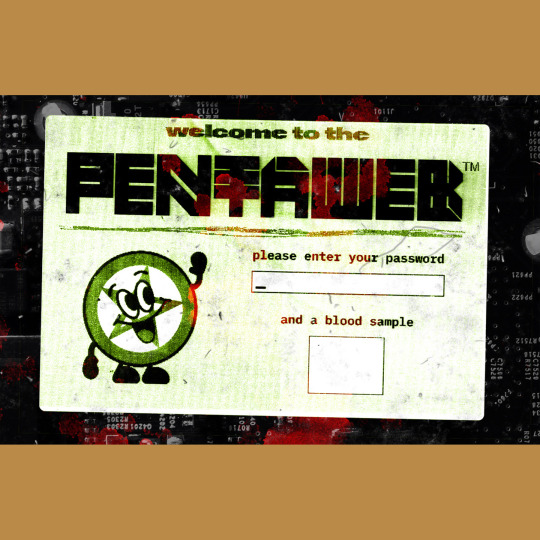


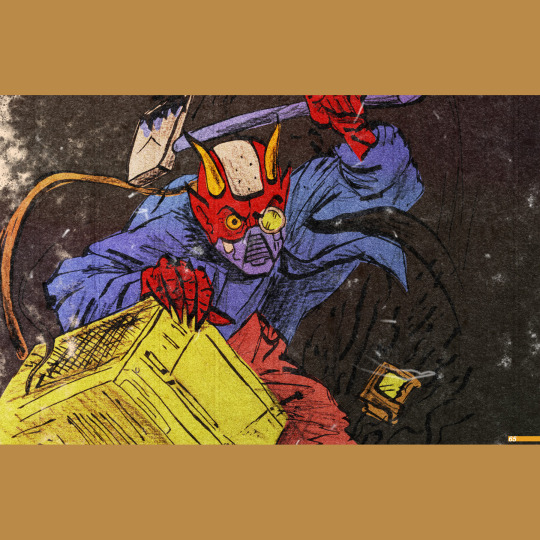

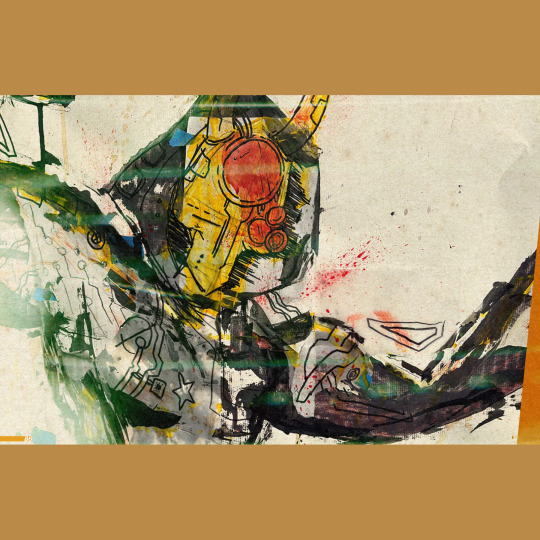

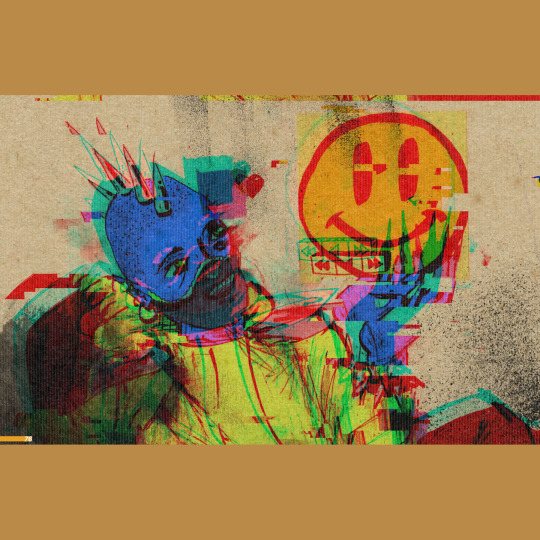
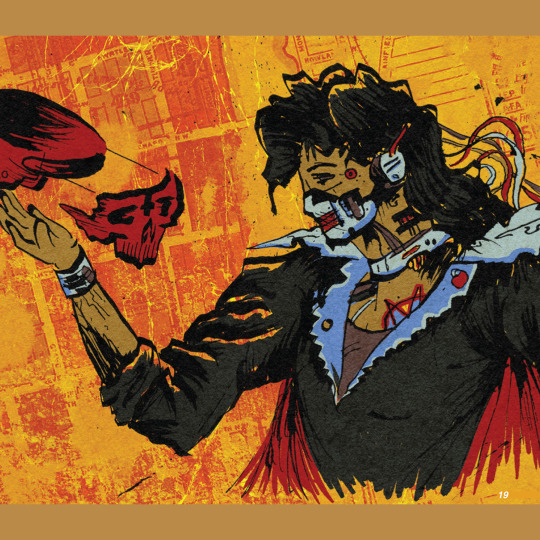
Leave it to World Champ Game Co. to find the edge of a pretty established sub-genre and push past it into something weird and new. This is Cybermetal (2022), an unholy fusion of cyberpunk, heavy metal and black magic. In an alternate timeline, a heavy metal band sacrifices Ronald Reagan on stage to resurrect their dead guitarist and eventually, the gates of Hell open and demons conquer America. In the wake of their victory, they turn a Midwestern city into Pentagram City, a place isolated from the rest of the world by walls of hellfire.
Being cut off meant a greater reliance on analog tech, like radio and walkie talkies and a LAN called the Pentaweb, but citizens of Pentagram City also have access the cybernetics developed during the Hell War to combat the demons. The neuronexus makes skill learning easy (think the Matrix) and combat slow and personal (the tech basically makes the user flicker on a different frequency of reality, so fast weapons just pass right through). In addition to humans, you can play as mutants, demons and husks, which are sort of cyberzombies created in the wake of the Y2K bug.
The software system provides lots of cool skills (turn your headbanging into a deadly weapon!). There’s crafting, there’s cyber surgery, rules for gang creation and management and long-term gang projects. There is a bunch of source material on Pentagram City and so, so many passing references to heavy metal. It’s sort of shocking that A. Adam fit all this text in and had room for so much gnarly art, B. That the art in question is as aggressive and unrelenting as CyBORG’s, but also of a totally distinct temperament and C. That the game is so smoothly playable — it uses a percentile skill system and does everything you’d expect from a tightly designed modern light rules set.
180 notes
·
View notes
Text
One way to spot patterns is to show AI models millions of labelled examples. This method requires humans to painstakingly label all this data so they can be analysed by computers. Without them, the algorithms that underpin self-driving cars or facial recognition remain blind. They cannot learn patterns.
The algorithms built in this way now augment or stand in for human judgement in areas as varied as medicine, criminal justice, social welfare and mortgage and loan decisions. Generative AI, the latest iteration of AI software, can create words, code and images. This has transformed them into creative assistants, helping teachers, financial advisers, lawyers, artists and programmers to co-create original works.
To build AI, Silicon Valley’s most illustrious companies are fighting over the limited talent of computer scientists in their backyard, paying hundreds of thousands of dollars to a newly minted Ph.D. But to train and deploy them using real-world data, these same companies have turned to the likes of Sama, and their veritable armies of low-wage workers with basic digital literacy, but no stable employment.
Sama isn’t the only service of its kind globally. Start-ups such as Scale AI, Appen, Hive Micro, iMerit and Mighty AI (now owned by Uber), and more traditional IT companies such as Accenture and Wipro are all part of this growing industry estimated to be worth $17bn by 2030.
Because of the sheer volume of data that AI companies need to be labelled, most start-ups outsource their services to lower-income countries where hundreds of workers like Ian and Benja are paid to sift and interpret data that trains AI systems.
Displaced Syrian doctors train medical software that helps diagnose prostate cancer in Britain. Out-of-work college graduates in recession-hit Venezuela categorize fashion products for e-commerce sites. Impoverished women in Kolkata’s Metiabruz, a poor Muslim neighbourhood, have labelled voice clips for Amazon’s Echo speaker. Their work couches a badly kept secret about so-called artificial intelligence systems – that the technology does not ‘learn’ independently, and it needs humans, millions of them, to power it. Data workers are the invaluable human links in the global AI supply chain.
This workforce is largely fragmented, and made up of the most precarious workers in society: disadvantaged youth, women with dependents, minorities, migrants and refugees. The stated goal of AI companies and the outsourcers they work with is to include these communities in the digital revolution, giving them stable and ethical employment despite their precarity. Yet, as I came to discover, data workers are as precarious as factory workers, their labour is largely ghost work and they remain an undervalued bedrock of the AI industry.
As this community emerges from the shadows, journalists and academics are beginning to understand how these globally dispersed workers impact our daily lives: the wildly popular content generated by AI chatbots like ChatGPT, the content we scroll through on TikTok, Instagram and YouTube, the items we browse when shopping online, the vehicles we drive, even the food we eat, it’s all sorted, labelled and categorized with the help of data workers.
Milagros Miceli, an Argentinian researcher based in Berlin, studies the ethnography of data work in the developing world. When she started out, she couldn’t find anything about the lived experience of AI labourers, nothing about who these people actually were and what their work was like. ‘As a sociologist, I felt it was a big gap,’ she says. ‘There are few who are putting a face to those people: who are they and how do they do their jobs, what do their work practices involve? And what are the labour conditions that they are subject to?’
Miceli was right – it was hard to find a company that would allow me access to its data labourers with minimal interference. Secrecy is often written into their contracts in the form of non-disclosure agreements that forbid direct contact with clients and public disclosure of clients’ names. This is usually imposed by clients rather than the outsourcing companies. For instance, Facebook-owner Meta, who is a client of Sama, asks workers to sign a non-disclosure agreement. Often, workers may not even know who their client is, what type of algorithmic system they are working on, or what their counterparts in other parts of the world are paid for the same job.
The arrangements of a company like Sama – low wages, secrecy, extraction of labour from vulnerable communities – is veered towards inequality. After all, this is ultimately affordable labour. Providing employment to minorities and slum youth may be empowering and uplifting to a point, but these workers are also comparatively inexpensive, with almost no relative bargaining power, leverage or resources to rebel.
Even the objective of data-labelling work felt extractive: it trains AI systems, which will eventually replace the very humans doing the training. But of the dozens of workers I spoke to over the course of two years, not one was aware of the implications of training their replacements, that they were being paid to hasten their own obsolescence.
— Madhumita Murgia, Code Dependent: Living in the Shadow of AI
71 notes
·
View notes
Text
Mobile App Development: A Comprehensive Guide to Choosing the Right Software Development Company

In today’s digital age, mobile app development has become a cornerstone of technological advancement. As businesses strive to stay competitive in a rapidly evolving market, the demand for innovative software development companies and mobile app development agencies has skyrocketed. With the rise of smartphones and tablets, the need for Android app development companies and iOS app development companies has never been greater.
The Rise of Mobile App Development
Mobile apps have revolutionized the way we interact with technology. From social media platforms to e-commerce solutions, mobile apps have become an integral part of our daily lives. As the demand for mobile apps continues to grow, so does the need for skilled mobile app development professionals.
Choosing the Right Software Development Company
When it comes to software development companies, finding the right partner is crucial. A reputable software development company can help bring your app idea to life, ensuring it meets your business objectives and resonates with your target audience. Look for a mobile app development agency that has a proven track record of delivering high-quality apps for both Android and iOS platforms.
Android App Development: Unleashing the Power of the Google Play Store
With over 2.5 billion active Android devices worldwide, Android app development presents a massive opportunity for businesses looking to reach a global audience. Partnering with an experienced Android app development company can help you create a standout app that stands out in the crowded Google Play Store.
iOS App Development: Crafting Seamless Experiences for Apple Users
Apple’s App Store boasts over 2 million apps, making iOS app development a competitive landscape. To succeed in this space, you need an iOS app development company that understands the intricacies of Apple’s ecosystem and can create apps that deliver seamless experiences to iPhone and iPad users.
The Future of Mobile App Development
As technology continues to advance, the future of mobile app development looks promising. From augmented reality to artificial intelligence, the possibilities are endless. By partnering with a reputable software development company or mobile app development agency, you can stay ahead of the curve and create apps that redefine the way we interact with technology.
In conclusion
mobile app development is a dynamic and ever-evolving field that offers endless opportunities for businesses looking to innovate and connect with their audience. By partnering with the right software development company or mobile app development agency, you can turn your app idea into a reality and make a lasting impact in the digital landscape.
#Mobile App Development#Software Development#App Development Agency#Android App Development#Ios App Development Co
1 note
·
View note
Note
I know you love scivener, but do you know anything about ellipsus? It's meant to be an aternative to google docs for collaborative writing.
I heard about them when they dropped nanowrimo as a sponsor over their inclusion of AI bullshit, which seemed promising. And digging around on their homepage I saw mentions of beta reading and ao3, and apparently they're trying to promote themselves on Tumblr now.
So it really sounds like we're the target audience, which could be great, but I don't know enough to be able to tell if there's an obvious catch somewhere?
--
This is the first I've heard of them. A quick scroll through their website seems promising.
As usual, the basic questions are:
How much does this product cost to develop?
Do they have a business plan that makes sense with that cost?
This kind of software can, theoretically, be made by a few friends dicking around, not a huge programmer team all of whom have it as their primary job, so it isn't the pile of massive red flags that all attempts at social media are.
From the site:
"Today we are a small, close-knit team of seven, located across the post-capitalist landscapes of Berlin, Bologna, Buenos Aires, and Szczecin. (So much for our alliteration-based hiring strategy.) True to our mission, we're a progressive, remote-friendly company that prioritizes creativity, community, and creative exchange."
Jobs are listed as: Co-founder and CEO, Co-founder and community, Product and marketing, Design, and Engineering x3.
That seems like a reasonable breakdown and a size of team that could possibly be paid for with some non-insane business model.
The types of red flags we're looking for are
"We want to be the next instagram!"
Many idea people with nebulous skills, few programmers
Thinking you can run tumblr with three programmers
Thinking you can pay for 100 programmers with a cheapass subscription model
Programmers are random, cheap contract workers the founders don't know
Venture capital from sources that will want a big payout rather than support from people who share the goals/values of the team
Extremely overcrowded field with tons of products that do exactly this already
Unclear nature of product or a product that doesn't seem to actually have a market
etc.
What they say about money is in the FAQ:
Will Ellipsus have a paid plan? In order to grow the team and fund ongoing feature development, we will need to charge for a version of Ellipsus at some point. A paid version would be targeting users with specific needs related to advanced security, data syncing, and collaboration. But there will always be a free version of Ellipsus, and we want to be as generous as possible in what's included on that free plan (e.g., unlimited docs and drafts, for starters). It takes time to build a great freemium experience (not to mention a premium product people will happily pay for), which is why we won't roll that out in 2024. While the features that will be included in our paid plan aren't final-final, we can share that everything in the product today will be included in our free plan.
This sounds reasonable. It just remains to be seen whether they keep at it or go belly up (taking your data with them). I guess you'd have to know more about the specific people building this to decide whether they'll be reliable.
The biggest potential issues I see are it being difficult to get people to ditch google docs despite its issues, this taking off big time and the owners deciding to sell it for $$$$$$ to someone who will then ruin it, or the team just not being competent.
But since I don't know any of them, I have no idea how good they are at business.
71 notes
·
View notes
Text
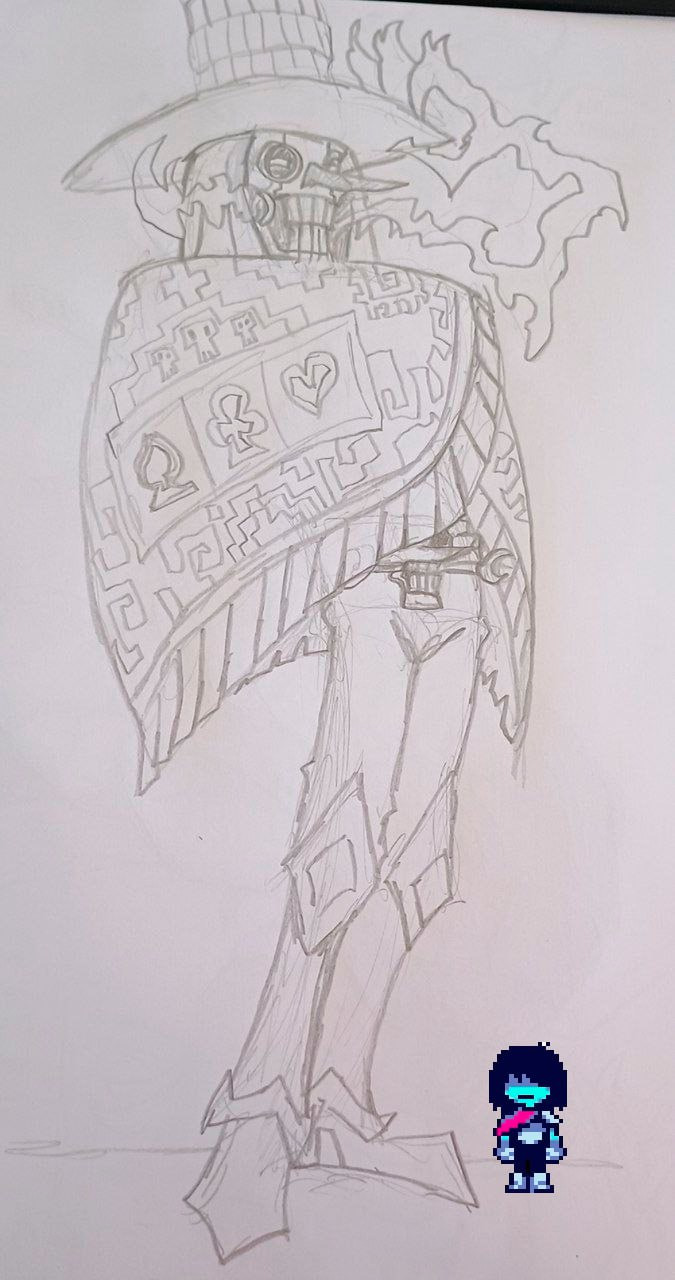
I had time to put into sketch a rough draft of how my SpamEX [[TAQUIÖN]] would look like. I need to do a ton of research about him before doing a clean ref-sheet.
Basically he has 4 arms, but they are braided in bundles of two to each side and tucked against the chest-plate. Because those arms are useless to manipulate objects (the hands are literal laser-guns that can split in half), he produces some kind of ionized smoke from the porthole filters to the sides of his skull faceplate (based on the gas used on old casino machines to fill up the lights -- he's basically constructed after old broken wild-west casino machines and software). This ionized smoke is able to coalesce into more solid things like arms and deft hands (that he uses to play his 15-player Baccarat at his casino or to drink his coffee and spirits). He's used to manipulate objects with just his smoke, and leave his real arms for when he needs to deal with foes, rivals and unruly bounties.
More about him when I get the time to develop him a little more. Thanks to the "Spam Fam" for helping me get the courage to finally draw a first draft of my SpamEX (AFTER A YEAR; I was very shy and unsure about how people would react to my "Enterrador" SpamEX...).
The poncho should have some Mexican "Día de los Muertos" patterns that I need to research later to give it a more readeable pattern to the poncho. The symbols on it (the Pique, Trèfle and Coeur) means "LIFE, LUCK, LOVE" respectively (Fortune is forfeited since he became a greedy casino mogul when he became a SpamEX). The buckle of his belt is a big Spamton NEO skull (represents his transition from the dead NEO and reborn as an "undead" SpamEX).
Anyway, I think he's taller than that Kris, but will make that ref sheet with cleaner profile data when I get the time. If I reckon well, he was made after Kris forgot to check on Spamton tangled in the wires after Kris and co. defeated him with violence. So Spamton's view on the Lightners soured so much that [[TAQUIÖN]] can't see them as anything else but mere walking SOUL capsules waiting to be pop'd...
oof I'm so hungry, I better go make my lunch... 🍝
#spwatch draws#spamton ex#SpamEX#very rought draft that will be subject to heavy changes#deltarune au#deltarune spamton#spamton g spamton#spamton deltarune#spamton#spex
22 notes
·
View notes